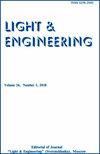Dynamically Controlled LED Luminaire for Contrast Visualisation of Biological Tissues During Surgical Procedures
IF 0.3
4区 工程技术
Q4 ENGINEERING, ELECTRICAL & ELECTRONIC
引用次数: 1
Abstract
The article reviews the main theoretical, engineering and technological, circuit-engineering and software aspects of development of a dynamically controlled luminaire based on light emitting diodes for contrast visualisation of biological tissues during surgical procedures. The design concept of such surgical luminaire is proposed, which combines high-quality white lighting and coloured accent lighting increasing the contrast of visualisation of particular tissues and borders between them. The calculation model of the luminaire optical system allows maximising the level of illumination and uniformity of illuminance and colour of the surgical area. The software of the luminaire allows to independently modifying intensity of radiation of six coloured light emitting diodes with blue (460 nm), turquoise (505 nm), green (530 nm), green-yellow (550 nm), orange (590 nm) and red (630 nm) light colours for synthesis of coloured lighting of virtually any chromaticity. The level of general lighting by means of phosphor light emitting diodes can also be varied within a wide range. Chromaticity and level of lighting are adjusted by means of pulse-duration modulation of light emitting diode current and the light parameters of the luminaire are controlled by a remote computer via a radio channel. This medical luminaire is primarily designed for lighting during surgical procedures and it can also be used for visual diagnostics based on the colour of analysed tissues.动态控制的LED灯具用于外科手术过程中生物组织的对比可视化
本文综述了一种基于发光二极管的动态控制灯具的主要理论、工程技术、电路工程和软件方面的发展,用于外科手术过程中生物组织的对比可视化。提出了这种手术灯具的设计理念,它结合了高质量的白色照明和彩色重点照明,增加了特定组织和它们之间边界的视觉对比。灯具光学系统的计算模型允许最大限度地提高手术区域的照明水平和照度均匀性和颜色。该灯具的软件允许独立修改辐射强度的六种彩色发光二极管与蓝色(460纳米),绿松石(505纳米),绿色(530纳米),绿黄(550纳米),橙色(590纳米)和红色(630纳米)光的颜色合成彩色照明几乎任何色度。利用荧光粉发光二极管的一般照明水平也可以在很宽的范围内变化。通过对发光二极管电流的脉宽调制来调节照明的色度和亮度,并通过无线电信道由远程计算机控制灯具的照明参数。这种医用灯具主要是为外科手术期间的照明而设计的,它也可以用于基于分析组织颜色的视觉诊断。
本文章由计算机程序翻译,如有差异,请以英文原文为准。
求助全文
约1分钟内获得全文
求助全文
来源期刊

Light & Engineering
ENGINEERING, ELECTRICAL & ELECTRONIC-OPTICS
CiteScore
1.00
自引率
50.00%
发文量
0
审稿时长
1 months
期刊介绍:
Our magazine
develops comprehensive communication within the lighting community, providing opportunities for discussion and free expression of opinions of specialists of different profiles;
contributes to the convergence of science and engineering practice, the search for opportunities for the application of research results in lighting and technological applications of light;
keeps the scientific community up to date with the latest advances in the theory of the light field, providing readers with operational professional information;
initiates international cooperation, promotes and distributes the results of Russian authors in the international professional community;
provides equal opportunities for authors from different regions of Russia and other countries.
The journal publishes articles in the following areas:
visual and non-visual effects of radiation on humans;
light field theory;
photometry and colorimetry;
sources of light;
ballasts;
light devices, their design and production technology;
lighting and irradiation installation;
light signaling;
methods of mathematical modeling of light devices and installations;
problems of energy saving in lighting, installation and operation of lighting installations;
modern production technologies of lighting products for lighting control systems;
innovative design solutions;
innovations in lighting and lighting design;
the study of the effect on plants and animals, problems of using light in medicine;
problems of disinfection of premises, water and smell elimination with the help of technology of UV radiation using;
problems of light in the ocean and space.
 求助内容:
求助内容: 应助结果提醒方式:
应助结果提醒方式:


